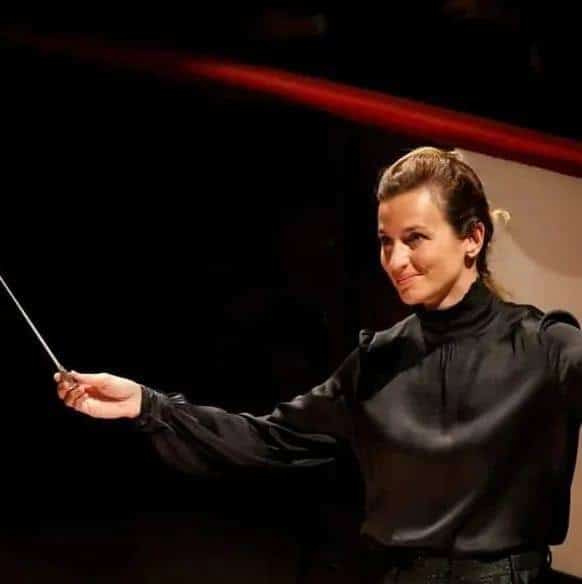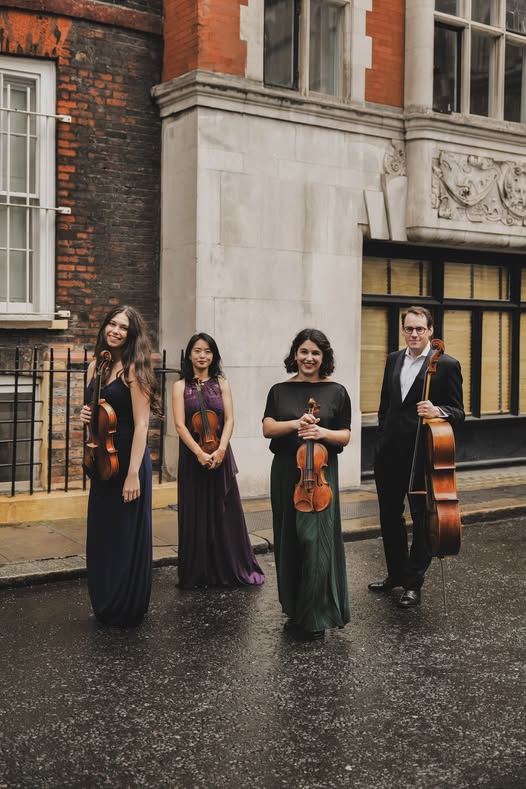A fix at the Enescu competition
mainWe hear that the winner of the cello section, Eun Sun Hong was a student of the president of the jury, Lluis Claret.
The South Korean defeated two Americans, Sarah Rommel and Tony Rymmer, in the final round.
She may be good, but this collusion must stop. Competitions have got to come clean.

UPDATE: Claret has just messaged his student on Facebook: That was great playing!! So proud of you!!





https://www.youtube.com/watch?v=P3A_65QeGbU
Fournier GREAT PLAYING!
This student’s playing is utterly mediocre in my opinion.
She has a rigid bow arm, no tone production, no sense of architechture, no pulse,
(reasonable intonation notwithstanding) and childish chords at the end.
Who cares whether or not the competition was rigged or not? Why are we not addressing the main issue?
The classical tradition is dying out or is it already dead?
Quite interesting. I had no idea that these competitions were essentially for students of
the jurists.
The solution, perhaps, is livestreaming of all competitions.And complete media coverage. Including social media. Complete transparency. Whatever happens, let it happen with the eyes of the world watching.
Perhaps we flutists are newcomers to the world of international competitions,
but with the very successful livestreaming of our Carl Nielsen Flute Competition last week,and the constant efforts of the organizers to respond immediately to every question and doubt of the international flute community, we had zero scandal level.
A fair decision was made and it was done in complete public view. The Competition
has gained a tremendous vote for its integrity from flutists around the world. Perhaps
this transparency of livestreaming is something to be considered for other competitions.
Rather than complaining about competitions that we know are fixed, we should be forming our own competition as an answer to the sham that is the international competition industry. Never mind that these exercises are a relic of a bygone era and serve no useful purpose to the public or the craft, but if we are going to have these sort of contests they should at least be run in a fair and unbiased fashion. Public shaming will only go so far, public action is what’s needed.
Obviously we need to work towards having impartial juries in competitions as far as it is possible. and there is clearly a long way to go in this area. But it is not the fault of these young musicians who are now being vilified online through insensitive comments such as this.
I do not agree that she is innocent.
Why do you not feel sorry for me for having had to endure her ear assault?
She has publicised herself,
the system has managed to recognise the absurd
viz
her mediocre playing as worthy of a first prize and
someone like Fournier is dead and forgotten.
I shall remember the great players of yesteryear to the end.
I will quote the user named Colin, from the Indianapolis post, as it applies here:
“What I find interesting is that your ‘rules for use’ (in the ‘About’ tab) cite ‘No Defamation’ and ‘No Personal Attacks’ and yet you’ve managed to completely discredit, defame, and (at least in my opinion) personally attack Ms. Cho and her career, completely ignore her wonderful performances in this competition.”
Making uninformed accusations for every competition across the world is irresponsible and the WRONG way to go about bringing attention to the troubles with jury selection…please find another way to go about it.
There has been no personal attack on Ms Cho, only on the jury process. Learn to read before you write, Mr N.
Open scoring. NOW.
Bravo! Boris is getting to the point!
I think that many results would be quite diffrent if decisions were not made behind closed doors!
Several times every single jury member answers on questions about participnats playing: “fantastic performance! Liked you the best of all and can not understand why you did not win anything. As you know, I am not alone in the jury…”
with every jury member liking you “the most” it is strange not to get even in the next round!
It might also improve self-awareness. Too often musicians who were not picked up at an audition or who didn’t place in a competition do not exactly know why. They may have some ideas but that does not equal a concrete constructive critique, handed down by a committee or jury.
Welcome to the Lebrecht Witchhunt Bulletin, everybody!
Just a few points on The Incredible Flutist’s view on complete public coverage of the competitions:
1. The semifinals and finals of the Enescu competition this year, in all sections, are streamed online and on national television. Of course, I don’t assume anyone here payed attention to Hong playing Enescu’s posthumous Cello Sonata by heart in the semis, in what alone could be deserving of a prize. Oh no, simply checking if the final results were clean and discreting the winners / competition completely, in case they weren’t, does suffice. By comparison, Mr. Lebrecht’s meticulous outcry didn’t bring harm to the Violin section, because apparently only the winner needs to be clean, even if surrounded by countless other jury students (one finalist being Amoyel’s).
2. The recent Rubinstein piano competition was fully (meaning from the early rounds to the finals gala) streamed online. That didn’t stop the jury (with Vardi and Kaplinski up in front) from having a field day all the way through. There was no serious backlash against most of the jury decisions, even after witnessing them. There were no serious consequences. Mr. Lebrecht the Scrutinizer didn’t rush one bit to point out the second prize went to a Kaplinski student, while Vardi lost the fight, with his student getting only top 4-6 placement.
1. Just streaming online the playing at all rounds only display the playing to bigger public audience, beside those in the hall, but will not influence any single jury – decisions if these stays anonymus (“as you know, I am not alone on the jury board”)
2. Playing my memory a piece shows one has a good memory, not more, not less, but for me no award winning reason.
3. Norman Lebrecht mainly put attention on an eventually close relation between finalists (potential prize winners ) with jury members and jury chairmen. He actually did not comment on any performance quality, as he was not there himself.
4. Under competitors it is not a big secret that own teachers in jury positions give a far more chance for winning anything. Jury memberships are one of the main reasons for students to study with someone, not only artistic reasons. I have noticed myself considerably increase at master class applications and studying with certain teachers before certain competitions, already 20 years ago.
correction:
2. Playing BY memory …
1. Correct, the topic was that streaming online the competition would improve the quality, fairness or vigilence of the results. As proven by this year’s Rubinstein competition, a jury like that one will be undeterred in its fixing games, even knowing the whole world is watching.
2. You are oversimplifying. I was talking about a rather particular case, where a very rare score by Enescu, which was not compulsory to be played by memory, was interpreted as such by this cellist alone. Her performace of it was, otherwise, also laudable. My point was that, through this Witchhunt Bulletin website, most of the readers find out virtually nothing about someone’s performance, but instead only if she is or not a jury student (which, then, is supposed to immediately discredit her or her results).
3. Yes, and this is what I call witchhunting. Also see no. 2.
all this @Andy Lim, of course
@Richard
Of course playing from memory is an additional merit, especially if it is a new piece, just learned for a competition. Just like the Q. E. competition where a contemporary piece, sometimes very complex, is specially written for a competition and presented at the beginning of the event to be played only one week later, is played by some from memory. But quite often the contestants who managed it to learn it by heart did not had the best interpretation/performance. That´s what I mean as comment on your “deserving a prize for memorizing”. Why not an award for “best memory”, but it should in my opinion not be linked to the musical performance. (by the way, I myself saw in the 70´s Henryk Szering with Ingrid Haebler recording in the Concertgebouw the Schubert violin/piano works. The obligatory bottle of whiskey next to him, and surprisingly he, the computer brained violinist, was playing from the scores!
2. Congratulations to all winners. The importance of the medals will be minimalized one day by the competition system itself, by the quantity of competitions, the gossip about jury fixing. The increase of competitions and their winners with the decrease of performing possibilities will solve the problem by itself.
3. Condolences to all non-winning contestants which should have won. But everybody entering competitions should know these things happen. All losers and their fans will proclaim loudly nothing was fixed if one day the win some prize.
Why has no one addressed thekingontheviolin’s opening comments?
Can’t anyone hear the difference between this student’s playing and Fournier’s? I agree with him that there is a much more serious issue at stake than jury corruption, which always existed.
Why has great playing disappeared?
Imagine reading out loud a dramatic news article involving a road accident with the deaths of the occupants of two vehicles in a montone but with perfect enunciation of every syllable and compare this with reading out loud the same article, only this time you recognise that the vehicles and their occupants are your own closest blood relatives.
Which of the two communicates the emotional content?
The Korean student’s or Fournier’s?
This issue is the one raised by thekingontheviolin and I agree with him that allegations of jury rigging, although stimulating gossip and hearsay, are insignificant when compared to
the crisis in the musical world whereby skill is worshiped and emotional communication relegated to oblivion.
She sounds good. Not in the elite handful, but still excellent, and still young. The 6th suite is notoriously difficult and usually unsuccessful, but she plays it quite well.
It’s hard for any of us to make comments on the fairness of this competition without having heard the other contestants.
What a ridiculous article! Obviously the writer did not even come to watch them playing and has no idea how to listen to people playing to judge on ther playings.
As a person who was there to listen to the three participants playing I personally believe that the competiton was cleaner and fairer than ever.
Way to avoid addressing the point of this article, which is the possibility of collusion. You should probably take your time and read the short post before resorting to an ad hominem attack on the writer.